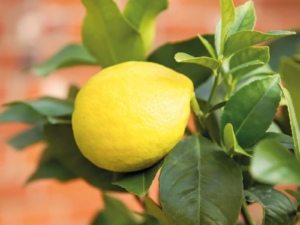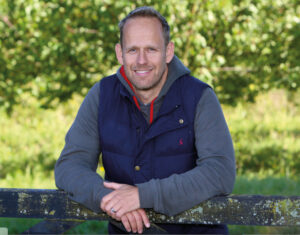Growing niche fruit and Oriental crops on the Essex coast
9th October 2023
Fruit & Vine spoke with Pete Thompson of Thompson’s Fresh Produce Ltd, which specialises in growing for the specialist Oriental food sector, as well as niche tree fruit, to find out more about how a vegetable farm in Harwich has become known for its citrus fruits and olives.

Meyer lemons – a hybrid citrus fruit which enjoys the Harwich microclimate.
Q. Tell us about the history of Thompson’s Fresh Produce Ltd at Brook Farm

Pete Thompson of Thompson’s Fresh Produce Ltd
A: The business was founded in 1948 after my grandfather moved from Suffolk at the end of the war when opportunity to buy land came up. Before then, the family had farmed in Suffolk as tenants and farm managers for generations.
Initially a market garden operation, the business then specialised in the 90s as the growth of the supermarkets pushed many small growers over the edge. We focused on crops for the Chinese restaurant trade in particular, and grew the business significantly within the sector. Due to this less conventional cropping, we found ourselves often being approached about ‘something new’, and this led to the more recent work in innovation.
We enjoy a maritime climate (which is perfect for growing) with the Stour Estuary to the north, the marshes and backwaters of Hamford Water to the south, and the North Sea to the east. The combination of light and the mild climate give us the ideal conditions for fruit growing.
Brook Farm covers a total of 500 acres, with 200 owned and 300 acres tenanted. Until recently, the cropping centred around growing vegetables, particularly Thompson’s Leaf and jumbo salad onions for the specialist food service sector, but now the farm includes 300 Meyer lemon trees (which are mainly in polytunnels, with some outdoors) and two olive groves – one with 400 trees, and one with 1,200, both featuring mixed olive varieties.
Q. As someone who likes to try new things, what are your biggest failures? And successes?
A: Failure: A large deep water hydroponics venture due to be part of an even larger aquaponics project.
Success: Probably hanging on this long despite being a (relatively) small farm in a very competitive sector – which is also down to our success in working on a few key products for the Chinese restaurants.
Q. What fruits are you currently growing?
A: Meyer lemons (a lemon/mandarin hybrid) and olives are currently our only fruit, and both at trial stage still. We have worked with the Fresca Produce Group and work with the Belazu Food Group, the top end wholesalers SHRUB Provisions and a handful of very talented and inspiring chefs. If I mention any, I will forget someone and then get grief, so I won’t name any names!
Q. Why are you so passionate about innovation?
A: I don’t think it is necessarily the innovation which is a passion; that is essential as a small grower for survival. What we are passionate about is growing excellent produce and doing more for the environment.
Q. How important do you feel sustainability and biodiversity are to the fruit industry?
A: They are absolutely essential, yet many growers are tied into a system which doesn’t allow them to consider a less intensive way of growing. The returns from retailers and the food service sector alike are unsustainable and do not provide sufficient returns for investment and innovation in most cases.
As farmers, we at Thompsons Fresh Produce are aware of our duty to care for the land, for the benefit of future generations, as previous generations have cared for it before us. It is incredibly important that we look after our local and wider environment and we take this responsibility seriously. We manage the farm sensitively to try to encourage wildlife and to ensure we reduce our impact on the wider, global environment.
As part of our efforts to create a more sustainable way of producing food, we use the 5 Capitals Framework to guide us. This means we have to consider not only the natural capital (earth, air, water, biodiversity etc) but also human, social, manufactured and financial capital.
We actively manage the farm to maintain and create wildlife habitat. The five on-farm reservoirs and their surrounds are our own nature reserves, and the farm is home to a variety of wildlife. Recent years have seen further tree and hedge planting, including the threatened black poplar as part of a wetland habitat creation.
Q. Other than climate, what you think are the biggest hurdles for UK growers when it comes to trying to diversify into different fruits?
A: It is simply costs, and most of that comes down to labour. Unless it is very large-scale crops which have the scale to justify robotics and automation, we are in a very tricky situation as UK producers.
Q. What’s the future for your company?
A: We have taken a major leap over the past six months and are now walking away from growing vegetables in the UK; letting go from our rented land and concentrating on our two niche crops, olives and citrus, as far as growing food is concerned.
We have launched an environmental services business, undertaking woodland and biodiversity net gain establishment and management. This fits well with our other business which is retail and wholesale supply of fruit and nut trees – www.terracefruits.com. We have been planting new woodlands already this winter for clients under the EWCO scheme and are also planting a new walnut grove for client
